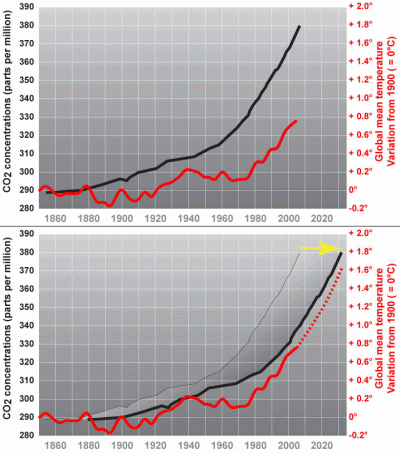Our current high level of carbon emissions is committing the planet to serious warming in coming decades. The only thing that will keep global warming within manageable limits is a deep, early reduction in emissions world-wide. [25 March 2008 | Peter Boyer]
As I write this, it’s a brisk, bright, lovely autumn day. There’s everything to be cheerful about, but somehow I feel lacking in the cheer department.

TOP Graph shows carbon dioxide levels in parts per million (black) with global average temperature (red). BOTTOM If we shift the carbon dioxide line ahead by 25 years we get a sense of where our temperatures are headed.
Our climate offers plenty to concern us: flood and fire, drought and famine, melting ice, everything going up (temperature, sea level, gas emissions, energy costs, blood pressure). But to me, the most worrying thing of all is inertia.
I worry about inertia in its common meaning, where people can’t or won’t act to fix the problem – though there are heartening signs. Governments are moving at last, and many Tasmanians are starting to take action themselves. More about that next week.
But inertia in its scientific context is what should really be putting a rocket under us and our leaders.
Isaac Newton defined inertia as the property by which things stay as they are – motionless or moving in a straight line – so long as there’s no external force acting to change this.
Anyone familiar with ships knows about the inertia of large moving objects, whereby it takes a while to change course or slow down. You need to plan well ahead.
It’s the same with climate, only more so. Global climate is a large-scale dynamic system. Because of the inertia of this system, it will be decades before changes applied today have any discernible effect.
Our climate’s inertia means that today’s warming temperatures are essentially the result of what we were doing in the 1970s and 1980s. What we’ve been doing since is still to have its full effect, and today’s high emissions won’t really hit home until around 2030.
Like it or not, we can’t alter the fact that Earth’s average temperature is going to continue to rise above today’s level. Well within 30 years temperatures will be near two degrees above pre-industrial levels. Above that, things get dangerous.
There’s the rub. While the scientists can see that our climate future is locked in for a quarter-century or so, based on today’s high-and-still-rising levels of greenhouse emissions, people in charge seem to have missed this critical detail.
Politicians of all persuasions are still talking as if we have options, and time – or as if factors such as energy costs demand restraint in curbing emissions. And still the emissions continue, unabated.
Ideas and talk, as I tell my audiences, have no effect on Planet Earth, which responds only to real, physical action. Let us plan, carefully, but in the knowledge that the only measure to count will be the action that follows, and that such action is desperately, urgently needed.
